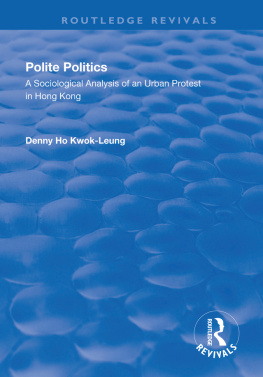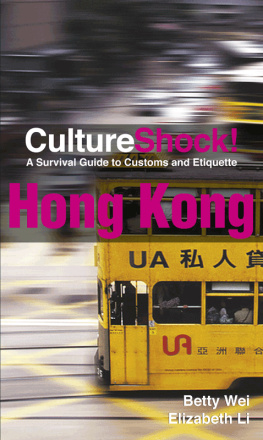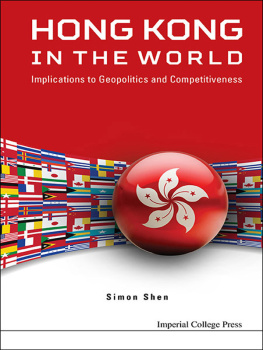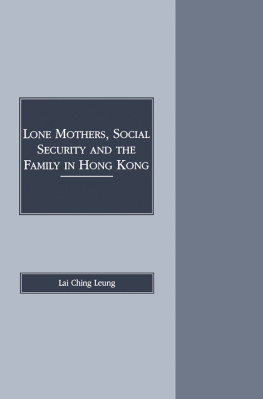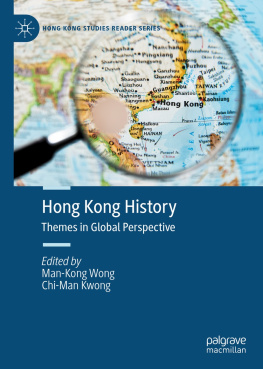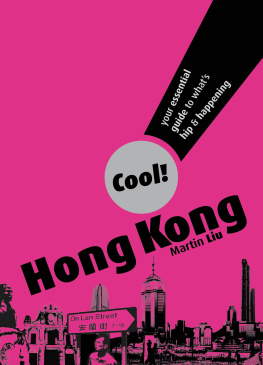
Innovative and Creative Industries in Hong Kong
The experience of Hong Kongs innovative and creative industries and the challenges they face serves as an important case study for other Chinese and Asian cities that are actively developing their innovative and creative industries in the era of globalization. The return of sovereignty over Hong Kong back to China in 1997 has led to both collaboration and competition between the two places in innovative and creative sectors for the Greater China and Asian Regions. Hong Kong has remained unique in spite of the integration, but she has to strike a delicate balance between being simultaneously a Chinese and an international city.
This book looks at different innovative and creative industries, such as international art and culture exhibition, innovative technology, digital entertainment, TV and movies, as well as government policy for innovative and creative industries, particularly the changing competitive landscape brought about by the latest Great Bay Area development. Drawing insights from cultural history, innovation economics, cultural policy studies, and cultural geography, this book explores the opportunities and challenges of Hong Kongs innovative and creative industries, in particular after the change of sovereignty in 1997. It demonstrates that the citys legacy, and heavy government input in capital, does not guarantee their sustainable development. This is a book not only for policymakers or academics interested in innovative and creative industries but also to students contemplating a career in these areas in Hong Kong, the Greater China and the Asian region.
Grace L K Leung is a lecturer in the School of Journalism and Communication, Chinese University of Hong Kong, and a Visiting Scholar, School of Journalism and Communication, Tsinghua University, China. She has also been a popular commentator on innovative and creative industry development in Hong Kong and the Greater China Region for over two decades.
Routledge Contemporary China Series
Urbanization, Regional Development and Governance in China
Jianfa Shen
Midwifery in China
Ngai Fen Cheung and Rosemary Mander
Chinas Virtual Monopoly of Rare Earth Elements
Economic, Technological and Strategic Implications
Roland Howanietz
Chinas Regions in an Era of Globalization
Tim Summers
Chinas Climate-Energy Policy
Domestic and International Impacts
Edited by Akihisa Mori
Western Bankers in China
Institutional Change and Corporate Governance
Jane Nolan
Xinjiang in the Twenty-First Century
Islam, Ethnicity and Resistance
Michael Dillon
China Studies in the Philippines
Intellectual Paths and the Formation of a Field
Edited by Tina S. Clemente and Chih-yu Shih
Innovative and Creative Industries in Hong Kong
A Global City in China and Asia
Grace L K Leung
Innovative and Creative
Industries in Hong Kong
A Global City in China and Asia
Grace L K Leung
First published 2019
by Routledge
2 Park Square, Milton Park, Abingdon, Oxon OX14 4RN
and by Routledge
711 Third Avenue, New York, NY 10017
Routledge is an imprint of the Taylor & Francis Group, an informa business
2019 Grace L K Leung
The right of Grace L K Leung to be identified as author of this work has been asserted by her in accordance with sections 77 and 78 of the Copyright, Designs and Patents Act 1988.
All rights reserved. No part of this book may be reprinted or reproduced or utilised in any form or by any electronic, mechanical, or other means, now known or hereafter invented, including photocopying and recording, or in any information storage or retrieval system, without permission in writing from the publishers.
Trademark notice : Product or corporate names may be trademarks or registered trademarks, and are used only for identification and explanation without intent to infringe.
British Library Cataloguing in Publication Data
A catalogue record for this book is available from the British Library
Library of Congress Cataloging in Publication Data
A catalog record for this book has been requested
ISBN: 978-1-138-06849-0 (hbk)
ISBN: 978-1-315-15791-7 (ebk)
Typeset in Galliard
by Swales & Willis Ltd, Exeter, Devon, UK
To my parents and their generation
who worked so hard to build up
this beautiful global city
My interest in Hong Kong culture began at a young age when Cantonese dialect movies, popular TV dramas, favorable indigenous comic books, the omnipresence of Cantopop through radio broadcasting, widespread circulation of entertainment magazines and newspapers, martial arts novels, and so on, were major entertainment sources filling up my childhood memories. This material accompanied the growth of our generation and played an important role as a socializing agent to build up community identity and cultural bonds within our society. Local popular culture also saw us witness the transformation of this city and served as a window through which one may make sense of, and understand, the immersive societal and cultural change.
This book is therefore a tribute to the Hong Kong creative and culture industry. The creative and culture industry is not only an economic sector that drove Hong Kongs economic miracle in the past decades, it meant a lot to our baby boomer generation, born and raised in Hong Kong during the 1970s and 1980s. After doing research for this project, I came to realize that the prosperity of the Hong Kong culture and creative industry is by no means coincidental. Rather, it was the fruit of incessant labor and efforts of successive generations of people engaged in different culture sectors to overcome adverse production conditions, and who actively explored overseas markets. In fact, this enterprising spirit of our creativity and culture not only contributed to Hong Kongs success in the past but will also affect our future.
This city had limited natural resources except human talent, which she attracted from all over the world to give an equal opportunity for them to thrive in this place. In the past, Hong Kong was regarded as an open society: diversified in culture, pluralistic in values, with a belief in meritocracy and fair competition, and embracing universal citizenship. Hong Kong is akin to a former popular singer obsessed by her faded glory and who romanticizes her past. Baby boomers are the only generation in Hong Kong who witnessed her emergence from a poor and underdeveloped region into the Pearl of the East, and then witnessed turbulent political and economic crises after re-unification with China. Our personal identities are closely related to this tiny land and we also place our fate within the hands of this city.
Hong Kong is facing another turning point in history as China is emerging as the world power, which Chinese people take pride in. Because most of our parents emigrated from southern China, most of us have built up strong links to the country, and many still have relatives living there. Emotionally we know we are members of the Greater China community, and attached to Chinese culture, but rationally we are not embracing all Chinese culture without reservation. We grew up in a time and space that advocated equality, individualism, autonomy, fair play, transparency, accountability, human dignity, all of which are not directly derived from Chinese culture. Our dual identity makes it difficult to submit to an authoritarian style that provides little room for negotiation. China is both Hong Kongs biggest asset and threat in that we rely on her so deeply but are in constant conflict with her. How to co-exist with such a giant neighbor and make appropriate responses to her interference in domestic politics are daily questions Hong Kongs people face today. However, China also needs to learn how to accommodate Hong Kongs differences and culture to manage a world class metropolis.




